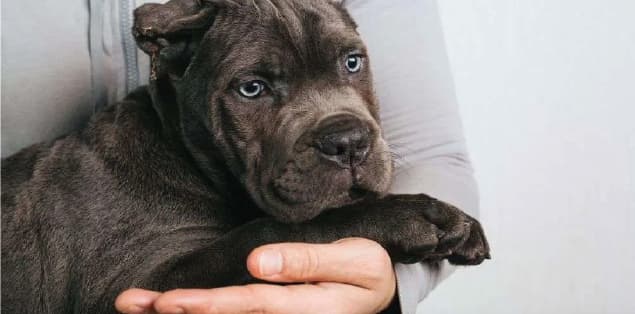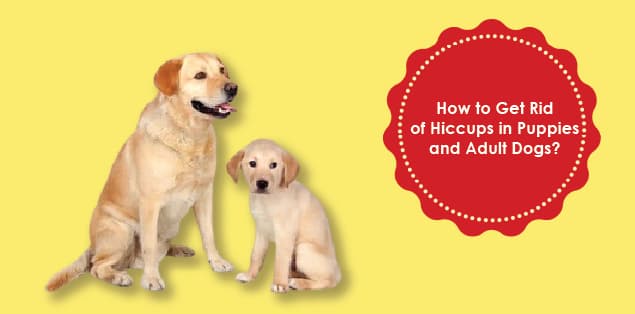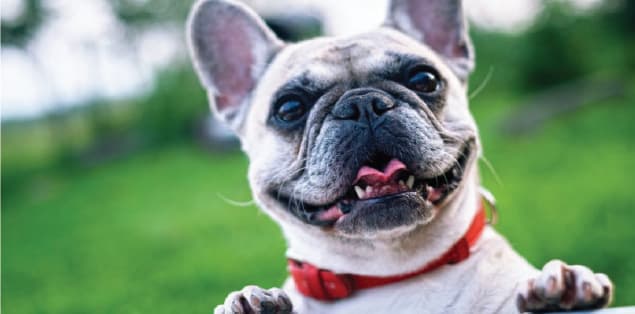Let’s start with a basic question, ‘What is a hiccup?’ A hiccup is an involuntary contraction relating to the diaphragm. Puppy hiccups are much more common than dog hiccups and are vital for puppyhood.
Dog owners know that hiccups are very irritating, but puppy hiccups are cute, and that sound makes all of us laugh. So why do puppies get hiccups? A puppy hiccupping after a meal or before going to sleep is very short-lived and extremely common. Puppies experience hiccups till 6 months after their birth.
However, in some cases, puppy hiccups may be symptoms of poor health conditions which can cause injury. In these cases, you should visit the vet to ensure your puppy’s good health. Hiccups are not usually common in adult dogs.
So Why Do Puppies Get Hiccups?
There are many reasons behind puppy hiccups:
- Puppies usually get hiccups after eating or drinking too fast as they ingest air along with their food or water.
- Puppies get excited easily, so a sudden rush of energy may cause hiccups.
- Sleeping puppies are more likely to get hiccups than awake ones, as tiring sleeps cause hiccups.
- Puppies have weak organs and digestive systems, which may be a reason for their hiccups.
- Stress is also a significant factor in puppy hiccups. This is the case with dogs of any age, but it’s not more common than dogs licking their lips or yawning due to stress.
Are Puppy Hiccups Only Triggered at Night?
No, puppy hiccups or occasional hiccups are not triggered only at night. They can occur anytime throughout the day. Hiccups in puppies are more common when they are sleeping or at night because they are cold and idle; hiccups occur in puppies mostly when they are idle and cold.
Do Adult Dogs Also Get Hiccups?

Yes, just like normal humans, adult dogs also get hiccups. But, hiccups in adult dogs are less common than in puppies. This is because puppies intake more air inside their lungs while breathing because their excitement levels are too much compared to adult dogs.
Also, puppies have weaker muscles and immature bones and bodies, making them more vulnerable to muscular contractions. Therefore, it is extremely common for a puppy to hiccup daily. Hiccups are harmless and normal if they last only for a few minutes.
What Causes Hiccups in Adult Dogs?
There is no accurate reason behind hiccups in adult dogs. However, some researchers say that hiccups are a genetic mechanism that dogs and we inherited since we were in fetal development.
Many species have shown documented proof of fetal hiccuping. However, some researchers also believe that hiccups in the fetal development stage or the womb were just a test that the muscles responsible for our breathing are functioning properly.
In adult dogs, hiccups are caused mainly when a dog has swallowed too much air inside. This usually happens when adult dogs eat very quickly, drink very quickly due to stress, play too much, get too excited for some reason, or inhale something unsettling or irritating. High anxiety levels and breathing rapidly cause the diaphragm to contract, resulting in hiccups.
How to Get Rid of Hiccups in Puppies and Adult Dogs?

Hiccups are not a matter of concern to dogs and puppies. Rather, we’ll say that dogs’ hiccuping is so damn adorable.
Dog owners can use the same cures that an average human uses, to help their dogs or puppies get over their hiccups. The most effective, common, harmless, and health-friendly remedy to get rid of dog hiccups is a teaspoon of honey, maple syrup, or Karo syrup.
These syrups work almost like a miracle and soothe your dog’s throat and smoothen the walls on their throat to eliminate any irritation resulting in them being distracted and breathing slowly. However, if you don’t have any of the aforementioned syrups, giving your dog some water might help eliminate the hiccups.
Sometimes, the action of swallowing or the swallow reflex action can help interrupt the hiccups in your dog. You may try massaging your dog’s chest and throat to create a simulated act of swallowing.
Encourage your dog to go for a walk, or rather take your dog out for a walk yourself to interrupt your dog’s breathing. Tummy rubs are also effective in stopping hiccups in dogs and puppies. Try giving a nice, smooth, and relaxing tummy rub to see if you can prevent hiccups this way.
Refrain from giving your dog water and food while on their back because this can lead to gagging, vomiting, or reverse sneezing.
If your dog is getting violent and abnormal hiccups, do not give your dog solid and large meals because this may choke your dog.
Suppose your puppy is vulnerable to hiccups and often has them due to eating or drinking very fast or hastily. Slow your puppy down by either getting him into a habit of eating slowly or patting him on the back and getting him to calm down while eating.
Please don’t give your dog large amounts of water; instead, give them small amounts of water in intervals. Moreover, give small quantities of food and wait for him to finish eating that, and after a few minutes, offer more food.
By doing so, you will make sure that he doesn’t swallow large amounts of air while they eat. You can try the slow feeding option to slow down your fast-eating dog or puppy.
Final Words – Why Do Puppies Get Hiccups?
Every pet’s health is important, but hiccups are a common phenomenon in almost everyone, humans or dogs. Dogs also face hiccups just like humans do. Pet parents can be relaxed knowing dogs’ hiccups are like human hiccups. You should be worried when your dog’s hiccups last for more than an hour.
Puppies are more likely to hiccup due to a majority of factors. Fast eating or drinking triggers hiccups. If that’s the case, just try interrupting your dog’s breathing pattern. A puppy’s hiccups are very adorable, and you would have a lovely time experiencing them.
Hiccups in dogs and puppies are typical, and there’s no need to panic or be worried if your dog has them. Pet owners should follow the steps to eliminate a puppy’s hiccup, and everything will be alright. Make it a habit to give dog food in small amounts to your dog.
